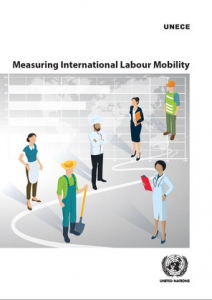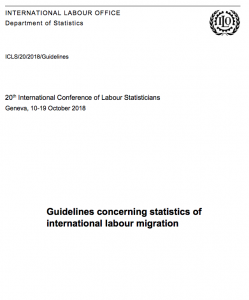What do the data look like?
The ILO provides global estimates of MDWs based on national data. See below for a breakdown of these by region. However, these national estimates are highly imperfect. Often counts extrapolate urban estimates to the whole country while there are fewer MDWs in rural areas, or miss out parts of the country altogether. Countries also use differing definitions of MDWs and/or exclude certain groups, such as child domestic workers, cross-border domestic workers, workers involved in domestic work as secondary or subsidiary employment, and those who migrated or are working irregularly. Therefore, these figures can be under or over-estimates for different countries and regions.
Beyond total figures, much of the information we have on MDWs and their experiences comes from various actors involved directly in the issue, such as migrant non-governmental organizations (NGOs) or associations, staff from consulates or diplomatic missions in destination countries, or recruitment agency representatives. These actors are often interviewed for studies or provide some of their records or other administrative data for research, including for NGO databases. There are also a number of qualitative studies based on interviews with MDWs themselves. For many, social networks are a vital source of solidarity and information. As a result, relevant research is often based on typical methods used for hard to reach or hidden populations (such as snowball and other chain-referral techniques). All of the above data collection mechanisms can be effective in reaching targeted populations of MDWs, but overall these keep our knowledge geographically bound and highly context specific.
What are some data issues?
The same dynamics that make MDWs’ work dangerous are the same that keep them out of statistical sight. Domestic work is a highly informal sector, which comes with many associated data challenges as both employers and employees are often outside of fiscal and social security systems. As domestic work is frequently carried out in private households, these are not usually monitored and traditional data on labour rights, such as from workplace inspectors, cannot be collected. For those who live with their employers and/or have restricted freedom of movement, it is especially difficult to gather any information. Further, many MDWs are in an irregular situation, meaning traditional data collection tools for migrant workers, such as censuses and household surveys, do not help. In practice, this also means many are reluctant to be counted or identified for fear of detention or deportation.
Why do we need this data?
First and foremost, we need to develop a deeper understanding of the characteristics and conditions of MDWs in different countries to strengthen capacities of policy makers and organizations to advocate and create solutions to improve MDWs’ access to justice, decent work and human rights, and ultimately to empower them. There is a need to know more about different employment practices, work conditions, wages, and much more across contexts. It is also useful to know details such as how many MDWs are part or full time, live in or out of their employers’ homes, and how long they stay in each workplace. Without more information, it is difficult to know which services would help MDWs more and how best to reach them. As countries move to create national legislation putting Convention No. 189 into effect, all this information is useful. On top of this, how the data are used will to a large extent determine its impact on MDW policy. To this end, it is crucial that targeted and sustained advocacy campaigns follow data collection.
Beyond this, there are other reasons to encourage collection of data related to MDWs. We need to evaluate the impact of relevant legislation on MDWs. For example, what are the effects of bilateral labour agreements (BLAs) that include domestic work? Many countries have banned women from emigrating as domestic workers, yet research suggests these bans may put women at greater risk during migrant journeys. Without data to evaluate legislation, how can we create better policy? Data can also be collected to evaluate the implementation and impacts of Convention No. 189.
Further, both migrant and women’s work are underestimated in labour force statistics and undervalued in national income accounts. Domestic work in particular is perennially undervalued and ultimately economically invisible. Better understanding the domestic sector as a whole could help change this and recognise the contributions of migrant labour. Domestic workers play an increasingly important economic and societal role in many countries as they become indirectly crucial for parts of the destination economy to function, and as they remit much of their earnings to origin countries. Therefore, we have a real need to value the migrant domestic work sector better, as well as its relation to other outcomes such as upskilling of other women and changes in transnational “global care chains”.
In such a poorly understood space, there is scope for data to have a large impact on policy. In Nepal, local research institutions with international organizations undertook an analysis of emigrating female domestic workers. The analysis became a powerful advocacy tool that led the Nepali government to lift a ban on female Nepali domestic workers migrating to Gulf countries and contributed to the adoption of the Foreign Employment Act which includes domestic workers.
Here are some suggestions to improve data on MDWs:
- Allow and/or expand the monitoring and inspection of relevant recruitment agencies and domestic workplaces and publish assessments. For example, in Uruguay and Peru labour inspectors can enter private residences. Alternatively, as labour inspectors are unable to enter private homes in Lebanon, social workers have instead been authorised to monitor conditions of domestic workers. With the right safeguards in place, these and alternative ways for inspectors and/or social workers to have regular contact with MDWs should be encouraged.
- Often grassroots actors govern this space, so work with civil society partners to collect data. For example, trade unions for migrant, domestic and/or irregular workers can help document MDW issues in their countries. This mechanism can even work across countries; the Senegalese and Mauritanian labour confederations signed a cooperation agreement to ensure violations of MDW rights are followed up. Similarly, capitalize on MDWs being a cross-ministerial issue and work across government areas to boost data collection efforts. At government level, MDW issues are sometimes managed by technical working groups or steering committees including labour, interior, gender, health, social affairs and other ministries; all of which may be able to initiate data collection efforts in their respective areas.
- Ensure there are appropriate firewalls between data collection mechanisms on irregular MDWs and any relevant law enforcement efforts, and that these are communicated to MDWs.
- Where formal frameworks exist for domestic workers, publish and disaggregate all relevant official data to show this. For example, countries including Spain and South Africa extend the minimum wage to domestic workers, and many others include migrant/domestic workers to varying degrees in national labour law and social security frameworks. Relevant national statistics should be disaggregated by occupation, gender and if possible, migratory status to learn more about MDWs’ conditions.
- Piggyback on policy and legislative progress on MDW by mainstreaming data collection mechanisms into implementation efforts.
- Attach data collection or monitoring mechanisms to national-level bilateral agreements, memoranda of understanding between countries of origin and destination, regional cooperation frameworks that include MDWs, as well as any attempts to implement Convention No. 189 at any level.
- Undertake analysis and research to monitor and evaluate the impact policies and programs have on MDWs, and use this to refine interventions.
- Maximise the impact of relevant data analysis and research, by including clearly actionable policy recommendations in project outputs and designing targeted advocacy and/or awareness-raising campaigns for the public and selected policy makers on selected topics.










